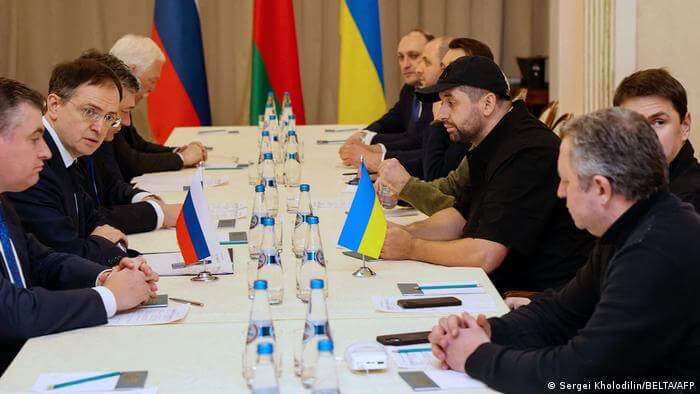On Monday, delegations from Ukraine and Russia met at an undisclosed location along the Ukrainian-Belarusian border near the Pripyat River in the Gomel region to discuss a possible ceasefire to Russia’s ongoing full-scale military assault on Ukraine. Although the talks failed to yield any immediate results, both Moscow and Kyiv affirmed that they will continue diplomatic contact.
The Ukrainian delegation fielded several high-ranking officials, including Presidential advisor Mykhailo Podolyak, Minister of Defence Oleksiy Reznikov, and Deputy Minister of Foreign Affairs Mykola Tochytskyi. Ahead of the talks, Kyiv made it clear that an immediate ceasefire and a complete withdrawal of all Russian troops were at the top of its agenda.
Russia, meanwhile, was represented by Presidential advisor Vladimir Medinsky and Deputy Foreign Minister Andrey Rudenko, among high-ranking officials. The Kremlin stressed that “the negotiators should talk in silence,” failing to disclose Moscow’s agenda before the meeting. Going into the meeting, Medinsky said, “We definitely have an interest in reaching some agreements as soon as possible.”
⚡️ Talks between the Russian 🇷🇺 and Ukrainian 🇺🇦 delegations have started in the Gomel region at the border between Ukraine and Belarus 🇧🇾 .
— Dmitry Mironchik (@DmitryMironchik) February 28, 2022
Belarus FM Makei welcomed the delegations on behalf of the Head of State: “You can feel perfectly safe. It is our sacred duty” pic.twitter.com/TyUB3YNLAV
After almost five hours of discussions, Ukraine’s Podolyak said both the delegations will return to their respective capitals for further consultations with their leaders. He also confirmed that the two delegations had “discussed the possibility of meeting for a second round of negotiations soon.” However, Podolyak noted that the Russian side “unfortunately still has a non-objective understanding of the destruction it has caused.”
Belarusian Minister of Foreign Affairs Vladimir Makei, who mediated the Ukraine-Russia meeting, said that negotiations between the two nations could help avert a “Slavonic spring.” Makei told the press that Belarus is trying to make its own contribution in resolving the crisis. His remarks come after Belarus was criticised for trying to pressure Ukraine ahead of the talks by revoking its non-nuclear status, which now allows Minsk to host Russian nuclear weapons and for Russian troops to remain in the country indefinitely.
⚡️⚡️⚡️FM #Makei: Negotiations on the Pripyat River may begin a process that will prevent “a Slavonic spring” pic.twitter.com/fT4Ez1AWMe
— Belarus MFA 🇧🇾 (@BelarusMFA) February 28, 2022
On the other hand, Ukrainian President Volodymyr Zelensky expressed scepticism over Russia’s diplomatic efforts to end its war in Ukraine, as he pointed out that the Kremlin had conducted heavy shelling in Kyiv and Kharkiv amid ongoing peace talks. In a video on Facebook, Zelensky asserted that the shelling of Kharkiv constitutes a war crime since the city does not have a single military facility. Zelensky stressed, “We do not accept such tactics. Fair negotiations are when one side does not hit the other side with rocket artillery at the very moment of negotiations.”
Barbaric Russian missile strikes on the central Freedom Square and residential districts of Kharkiv. Putin is unable to break Ukraine down. He commits more war crimes out of fury, murders innocent civilians. The world can and must do more. INCREASE PRESSURE, ISOLATE RUSSIA FULLY! pic.twitter.com/tN4VHF1A9n
— Dmytro Kuleba (@DmytroKuleba) March 1, 2022
Steve Goose, the director of Human Rights Watch’s Arms Division, said in a statement, “Russian forces should stop using cluster munitions and end unlawful attacks with weapons that indiscriminately kill and maim.” Cluster munitions are a highly controversial weapon whose use has been banned by more than 100 countries, except Ukraine and Russia. Russia has used cluster munitions in Chechnya and Syria before. Ukrainian officials reported that at least 11 people died in Kharkiv on Monday during Russia’s missile attack.

